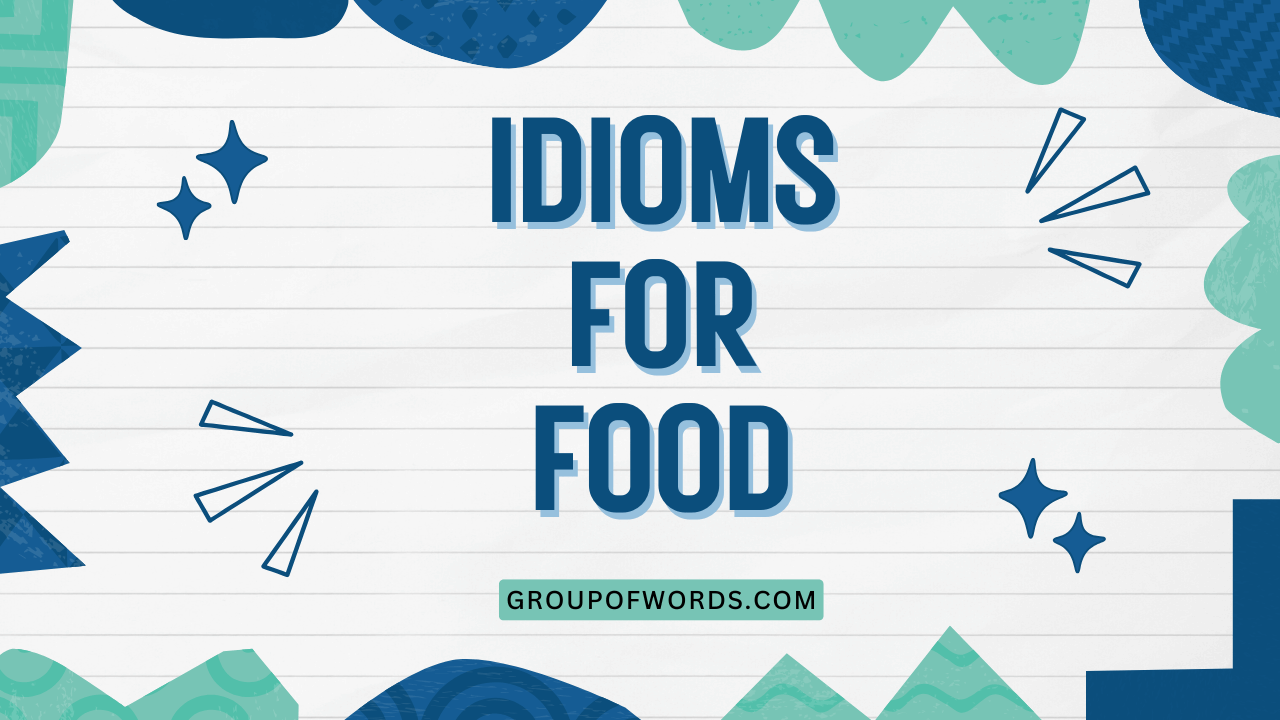Food Idioms: A Comprehensive Guide to Culinary Expressions
Idioms add color and depth to the English language, allowing speakers to express complex ideas with a few well-chosen words. Food idioms, in particular, are a rich source of figurative language, drawing on our everyday experiences with food to convey a wide range of meanings.
Understanding these idioms is crucial for comprehending nuanced conversations, literature, and media. This article provides a comprehensive guide to food idioms, exploring their definitions, structures, usage, and common pitfalls.
Whether you’re a student, a language enthusiast, or simply looking to expand your vocabulary, this guide will equip you with the knowledge and skills to master the art of culinary expressions.
Table of Contents
- Introduction
- Definition of Food Idioms
- Structural Breakdown
- Types and Categories of Food Idioms
- Examples of Food Idioms
- Usage Rules
- Common Mistakes
- Practice Exercises
- Advanced Topics
- FAQ
- Conclusion
Definition of Food Idioms
A food idiom is a phrase or expression where the words, when taken literally, do not represent the actual meaning. Instead, the phrase uses food-related terms in a figurative sense to convey a deeper or more abstract concept.
These idioms often draw upon the cultural associations and experiences we have with different foods, tastes, and cooking processes. Food idioms function as a type of figurative language, adding color and expressiveness to our communication.
They can be classified based on the type of food they reference (e.g., fruit, vegetables, meat) or the aspect of food they relate to (e.g., taste, preparation, consumption). Understanding food idioms requires recognizing that the literal meaning is not intended and interpreting the phrase within its specific context.
Structural Breakdown
Food idioms, like all idioms, are structurally fixed phrases. This means that their word order and composition are generally not flexible.
Altering the words or their arrangement can destroy the idiomatic meaning. Many food idioms follow common grammatical patterns, such as subject-verb-object or prepositional phrases.
However, their idiomatic meaning is independent of their grammatical structure. For example, “a piece of cake” follows a simple noun phrase structure, but it means “easy.” The structural elements of a food idiom contribute to its overall form, but the key to understanding it lies in recognizing its non-literal meaning.
Types and Categories of Food Idioms
Food idioms can be categorized in several ways, allowing for a more organized understanding. Here are a few common categories:
Taste-Related Idioms
These idioms use taste descriptors to convey feelings, experiences, or qualities. They often rely on the contrast between positive and negative tastes to express different ideas.
For instance, “sour grapes” describes the attitude of someone who pretends to dislike something they cannot have.
Ingredient-Related Idioms
These idioms incorporate specific food ingredients, such as fruits, vegetables, or spices, to represent various concepts. The chosen ingredient often has a symbolic association that contributes to the idiom’s meaning.
For example, “full of beans” uses beans to symbolize energy and enthusiasm.
Cooking-Related Idioms
These idioms draw on cooking processes and techniques to describe situations or behaviors. They often use verbs associated with cooking, such as “bake,” “fry,” or “stew,” to convey a sense of action or transformation.
For example, “cook up a storm” means to create something impressive or significant.
Dish-Related Idioms
These idioms use specific dishes or meals to represent broader ideas. The dish itself may have a cultural or historical significance that influences the idiom’s meaning.
For example, “that’s the way the cookie crumbles” uses the image of a broken cookie to express acceptance of an unfortunate situation.
Examples of Food Idioms
To illustrate the diverse range of food idioms, here are several examples categorized by the types described above. Each table contains examples that demonstrate the meaning and usage of common food idioms.
Taste-Related Examples
The following table provides examples of taste-related idioms, showing their meanings and example sentences. Each idiom uses a taste description to convey a feeling, experience, or quality.
| Idiom | Meaning | Example Sentence |
|---|---|---|
| Sour grapes | Pretending to dislike something you cannot have | He said he didn’t want the promotion anyway, but it was just sour grapes. |
| A bitter pill to swallow | An unpleasant fact or situation that is difficult to accept | Losing the contract was a bitter pill to swallow after all our hard work. |
| Sweeten the deal | To make an offer more attractive | They sweetened the deal by offering a higher salary and better benefits. |
| Sugarcoat | To make something seem more pleasant or acceptable than it really is | The politician tried to sugarcoat the bad news, but everyone knew the truth. |
| Taste of your own medicine | Being treated the same way you have treated others | He finally got a taste of his own medicine when his colleagues started ignoring him. |
| Have a sweet tooth | To enjoy sugary foods | I have a sweet tooth, so I always crave dessert after dinner. |
| Not to one’s taste | Not according to one’s preferences | The modern art exhibit was interesting, but not really to my taste. |
| Leave a bad taste in one’s mouth | To create a negative feeling or memory | The way they handled the situation left a bad taste in my mouth. |
| A taste of things to come | A small experience that suggests what future experiences might be like | The successful pilot project was a taste of things to come for the company. |
| As different as chalk and cheese | Completely different | They are as different as chalk and cheese; I don’t know how they are friends. |
| Something to chew on | Something to think about | The manager gave us something to chew on about improving customer service. |
| Half-baked | Poorly planned or thought out | The new project was a half-baked idea that was never going to work. |
| Full of hot air | Talking nonsense | The politician was full of hot air, making promises he couldn’t keep. |
| Cream of the crop | The best of the best | The company only hires the cream of the crop from top universities. |
| Eat your words | Admit you were wrong | He had to eat his words when the project succeeded beyond expectations. |
| Spill the beans | Reveal a secret | I didn’t mean to spill the beans about the surprise party. |
| Take something with a grain of salt | Not to take something too seriously or literally | You should take his advice with a grain of salt; he’s not always right. |
| Two peas in a pod | Very similar | They are like two peas in a pod, always agreeing on everything. |
| Piece of cake | Easy | The exam was a piece of cake; I finished it in half the time. |
| Bring home the bacon | To earn a living | Both parents work hard to bring home the bacon for their family. |
| Butter someone up | To flatter someone to get what you want | He tried to butter up his boss to get a promotion. |
| Have bigger fish to fry | To have more important things to do | I can’t worry about that now; I have bigger fish to fry. |
| In a nutshell | In summary | In a nutshell, the project was a complete success. |
| Out to lunch | Not paying attention; not with it | He seems a little out to lunch today; I wonder what’s wrong. |
Ingredient-Related Examples
The following table provides examples of ingredient-related idioms, showcasing how specific food items are used to represent abstract concepts. These idioms often draw on the symbolic associations of the ingredients.
| Idiom | Meaning | Example Sentence |
|---|---|---|
| Full of beans | Energetic and enthusiastic | The children were full of beans after their nap. |
| As cool as a cucumber | Calm and composed, especially in a difficult situation | Despite the pressure, she remained as cool as a cucumber. |
| A couch potato | A person who spends a lot of time sitting and watching television | He’s become a real couch potato since he retired. |
| Apples and oranges | Completely different and not comparable | Comparing their achievements is like comparing apples and oranges. |
| Go bananas | To become very excited or crazy | The crowd went bananas when the band started playing their hit song. |
| Second banana | A person who is subordinate or less important than another | He’s always been the second banana in the partnership. |
| Hard nut to crack | A difficult person to understand or deal with | He’s a hard nut to crack, but once you get to know him, he’s a good friend. |
| Nutty as a fruitcake | Crazy or eccentric | He’s a bit nutty as a fruitcake, but he’s also a genius. |
| Peaches and cream | Easy and pleasant | The project went as smooth as peaches and cream. |
| Lemon | Something that is defective or unsatisfactory | The car turned out to be a lemon; it broke down after only a week. |
| Life is a bowl of cherries | Life is wonderful and easy | She thinks life is a bowl of cherries, but she’ll soon learn it’s not. |
| Cherry-pick | Select the best or most desirable items | The company tends to cherry-pick the best employees from other firms. |
| Gravy train | A situation where someone can make a lot of money with little effort | He’s been riding the gravy train since he joined the company. |
| As red as a beet | Extremely embarrassed | She turned as red as a beet when she realized her mistake. |
| Egg someone on | Encourage someone to do something unwise or foolish | His friends egged him on to jump off the bridge. |
| Walk on eggshells | To be very careful not to offend someone | I have to walk on eggshells around my boss because he’s so sensitive. |
| Have your cake and eat it too | To try to enjoy two conflicting benefits at the same time | You can’t have your cake and eat it too; you have to make a choice. |
| A piece of cake | Something that is easy to do | The exam was a piece of cake; I finished it in half the time. |
| Cool beans | Great or excellent | “I got the job!” “Cool beans!” |
| Small potatoes | Unimportant or trivial | These issues are small potatoes compared to the main problem. |
| Cheesy | Tacky, corny, or in bad taste | That romantic movie was a bit cheesy for my liking. |
| Bread and butter | A main source of income or livelihood | Teaching English is her bread and butter. |
| A bad egg | A dishonest or unreliable person | He’s a bad egg; I wouldn’t trust him with anything. |
| Use your noodle | To use your brain or think hard | You’ll have to use your noodle to solve this problem. |
Cooking-Related Examples
The following table provides examples of cooking-related idioms, demonstrating how cooking processes and techniques are used metaphorically to describe situations or behaviors.
| Idiom | Meaning | Example Sentence |
|---|---|---|
| Cook up a storm | To create something impressive or significant | The chef cooked up a storm in the kitchen, preparing a feast for the guests. |
| Bake someone’s noodle | To make someone think very hard | That question really baked my noodle; I couldn’t figure out the answer. |
| Fry bigger fish | To have more important things to do | I can’t deal with this minor issue now; I have bigger fish to fry. |
| In the soup | In trouble | He’s really in the soup now after missing the deadline. |
| Stir the pot | To deliberately cause trouble or conflict | She always tries to stir the pot by spreading rumors. |
| Simmer down | To calm down | He needs to simmer down before he says something he regrets. |
| Boil down to | To be summarized or reduced to its essential elements | The problem boils down to a lack of communication. |
| Half-baked idea | Poorly planned or thought out | The new project was a half-baked idea that was never going to work. |
| Take the biscuit | To be the most remarkable or annoying thing | That takes the biscuit; I can’t believe he did that! |
| Mix like oil and water | To be incompatible or unable to get along | They mix like oil and water; they’re always arguing. |
| Strain at a gnat and swallow a camel | To focus on trivial matters while ignoring larger, more important issues | He’s always straining at a gnat and swallowing a camel. |
| Serve up | To present or offer something | The waiter served up a delicious meal. |
| Warm up | To make friendly or enthusiastic | The audience started to warm up after the comedian told a few jokes. |
| Dish out | To give or distribute something, often criticism or punishment | The teacher dished out a lot of homework this week. |
| Spoon-feed | To give someone too much help or information | The professor spoon-feeds the students instead of encouraging them to think for themselves. |
| Have a finger in every pie | To be involved in many activities or projects | He has a finger in every pie at the company. |
| Sell like hotcakes | To sell very quickly | The new smartphones are selling like hotcakes. |
| Eat humble pie | To admit you were wrong and apologize | He had to eat humble pie after his prediction turned out to be wrong. |
| Put all your eggs in one basket | To risk everything on a single venture | Don’t put all your eggs in one basket; diversify your investments. |
| A recipe for disaster | A situation that is likely to end badly | Their lack of planning is a recipe for disaster. |
| Get something cooking | To start something | Let’s get something cooking on this project. |
| Slow cook | To take your time | He’s slow cooking the deal, making sure every detail is perfect. |
| Whip something up | To quickly prepare something | I can whip up a quick dinner in about 30 minutes. |
| Turn up the heat | To increase the pressure or intensity | The boss turned up the heat to get the project done on time. |
Dish-Related Examples
The following table provides examples of dish-related idioms, illustrating how specific dishes or meals are used to represent broader ideas or situations. The cultural or historical significance of the dish often contributes to the idiom’s meaning.
| Idiom | Meaning | Example Sentence |
|---|---|---|
| That’s the way the cookie crumbles | That’s the way things are, and there’s nothing you can do about it | I didn’t get the job, but that’s the way the cookie crumbles. |
| A piece of cake | Something easy to do | The exam was a piece of cake; I finished it in half the time. |
| Comfort food | Food that provides a sense of emotional comfort or security | After a long day, all I want is some comfort food like mac and cheese. |
| Bread and butter | A main source of income or livelihood | Teaching English is her bread and butter. |
| Gravy train | A situation where someone can make a lot of money with little effort | He’s been riding the gravy train since he joined the company. |
| Spill the tea | To share juicy gossip or secrets | Come on, spill the tea! What happened at the party? |
| Soup to nuts | From beginning to end; completely | The course covers the topic from soup to nuts. |
| A can of worms | A situation that is more complicated than it appears | Opening up that investigation could open a can of worms. |
| Eat humble pie | To admit you were wrong and apologize | He had to eat humble pie after his prediction turned out to be wrong. |
| Hot potato | A controversial or difficult issue | The tax reform is a political hot potato. |
| Have a bun in the oven | To be pregnant | She has a bun in the oven and is expecting a baby in the spring. |
| Full plate | To have a lot of responsibilities or tasks | I have a full plate with work and family commitments. |
| A dog’s breakfast | A mess or a poorly organized situation | The project was a dog’s breakfast from start to finish. |
| Apple-pie order | In perfect order | She keeps her house in apple-pie order. |
| A plum job | A very desirable job | He landed a plum job at a prestigious law firm. |
| Not give a fig | Not care at all | I don’t give a fig about what he thinks. |
| A fine kettle of fish | A mess or a difficult situation | This is a fine kettle of fish we’ve gotten ourselves into. |
| Butter someone up | To flatter someone to get what you want | He tried to butter up his boss to get a promotion. |
| In a pickle | In a difficult situation | I’m in a bit of a pickle; I’ve lost my keys. |
| Easy as pie | Very easy | The test was as easy as pie. |
| Worth your salt | Deserving of your pay or position | Any employee worth their salt would have noticed the error. |
| Take the cake | To be the most remarkable or outstanding, often in a negative way | His behavior really takes the cake. |
| Eat someone out of house and home | To eat a lot of someone else’s food | Teenage boys can eat you out of house and home. |
| Have a lot on your plate | To have many responsibilities | I have a lot on my plate right now, so I can’t take on any more projects. |
Usage Rules
Using food idioms correctly involves understanding their context and intended meaning. Here are some key rules to follow:
- Context is crucial: Always consider the context in which the idiom is used. The surrounding words and the overall situation will provide clues to its meaning.
- Avoid literal interpretations: Remember that idioms are not meant to be taken literally. Focus on the figurative meaning and the concept it represents.
- Maintain the structure: Idioms are typically fixed phrases, so avoid altering the words or their order. Changes can destroy the idiomatic meaning.
- Consider the audience: Be mindful of your audience when using idioms. Some idioms may be unfamiliar to non-native speakers or people from different cultural backgrounds.
- Practice: The best way to master food idioms is to practice using them in your own speech and writing. Pay attention to how native speakers use them and try to incorporate them into your vocabulary.
Common Mistakes
Learners often make mistakes when using food idioms due to their unfamiliarity with the figurative meanings. Here are some common errors to avoid:
| Incorrect | Correct | Explanation |
|---|---|---|
| He was literally full of beans after eating. | He was full of beans after his nap. | “Full of beans” means energetic, not literally full of beans. |
| She is cool like a real cucumber. | She is as cool as a cucumber. | The correct idiom is “as cool as a cucumber.” |
| That test was a piece from cake. | That test was a piece of cake. | The correct idiom is “a piece of cake.” |
| I have bigger fishes to fry. | I have bigger fish to fry. | The correct idiom is “bigger fish to fry.” |
| He spilled the beans everywhere. | He spilled the beans about the surprise party. | “Spill the beans” means to reveal a secret. |
| She is like two peas from a pod. | They are like two peas in a pod. | The correct idiom is “two peas in a pod.” |
| Don’t put all of your eggs at one basket. | Don’t put all your eggs in one basket. | The correct idiom is “put all your eggs in one basket.” |
| The project was a dog’s breakfast, it had actual dog food. | The project was a dog’s breakfast from start to finish. | “A dog’s breakfast” means a mess, not actual dog food. |
Practice Exercises
Test your understanding of food idioms with these practice exercises. Choose the correct idiom to complete each sentence.
Exercise 1: Choose the correct idiom to complete the sentence.
| Question | Options | Answer |
|---|---|---|
| After working all night, I was __________. | a) full of beans, b) fried, c) as cool as a cucumber | b) fried |
| The new product is __________; everyone wants one. | a) selling like hotcakes, b) a piece of cake, c) full of beans | a) selling like hotcakes |
| He had to __________ after making a false accusation. | a) spill the beans, b) eat humble pie, c) stir the pot | b) eat humble pie |
| She’s always __________ by spreading rumors. | a) cooking up a storm, b) stirring the pot, c) spilling the tea | b) stirring the pot |
| Don’t __________; diversify your investments. | a) have your cake and eat it too, b) put all your eggs in one basket, c) be as cool as a cucumber | b) put all your eggs in one basket |
| The exam was __________, I finished it in half the time. | a) a bitter pill to swallow, b) a piece of cake, c) full of beans | b) a piece of cake |
| He is __________, making promises he can’t keep. | a) full of beans, b) full of hot air, c) as cool as a cucumber | b) full of hot air |
| She is __________, always calm and composed. | a) as cool as a cucumber, b) full of beans, c) selling like hotcakes | a) as cool as a cucumber |
| The politician tried to __________ the bad news. | a) spill the beans, b) sugarcoat, c) stir the pot | b) sugarcoat |
| They are __________, always agreeing on everything. | a) apples and oranges, b) two peas in a pod, c) a piece of cake | b) two peas in a pod |
Exercise 2: Match the idiom with its meaning.
| Idiom | Meaning | Answer |
|---|---|---|
| Sour grapes | To reveal a secret | D |
| Spill the beans | To be in trouble | E |
| A hard nut to crack | Pretending to dislike something you can’t have | A |
| In the soup | A difficult person to understand | C |
| As cool as a cucumber | Calm and composed | B |
Advanced Topics
For advanced learners, exploring the etymology and cultural context of food idioms can provide a deeper understanding. Many food idioms have historical roots that reflect the social and economic conditions of their time.
For example, the idiom “bring home the bacon” originated in the early 20th century and referred to the prize given to the winner of a wrestling match. Understanding these historical connections can enhance your appreciation of the richness and complexity of food idioms.
Additionally, comparing food idioms across different languages can reveal interesting cultural differences in how food is perceived and used metaphorically.
FAQ
Here are some frequently asked questions about food idioms:
- What is the difference between an idiom and a metaphor?
An idiom is a fixed phrase with a non-literal meaning, while a metaphor is a figure of speech that directly compares two unlike things. Idioms often have a conventionalized meaning that is not immediately apparent from the individual words, whereas metaphors rely on the suggestive similarity between the two things being compared.
- How can I learn more food idioms?
Read widely and pay attention to how native speakers use food idioms in conversation, literature, and media. Keep a notebook of new idioms you encounter and practice using them in your own speech and writing. Online resources, such as dictionaries and idiom lists, can also be helpful.
- Are food idioms universal across all English-speaking countries?
While many food idioms are widely understood, some may be more common in certain regions or countries than others. Be aware of regional variations and consider your audience when using food idioms.
- Is it okay to use food idioms in formal writing?
Food idioms are generally more appropriate for informal or conversational writing. In formal writing, it is best to use more direct and literal language.
- How do I know when a phrase is an idiom and not just a literal expression?
If the phrase doesn’t make sense when taken literally, it is likely an idiom. Also, if the phrase is commonly used in a particular way, it is probably an idiom. Context is key to understanding the meaning.
- Why are idioms so important to learn in a new language?
Idioms are important because they are a natural part of everyday language. Understanding idioms will help you comprehend native speakers and express yourself more naturally. Learning idioms allows you to understand the culture and nuances of the language.
- How can I practice using idioms in conversation?
Try to incorporate a few new idioms into your conversations each day. You can also ask a native speaker to correct you if you use an idiom incorrectly. Watch movies and TV shows in English and pay attention to the idioms that are used. Participate in language exchange programs.
- Are there specific resources or websites that can help me learn idioms?
Yes, there are many resources available online. Websites like “The Free Dictionary,” “UsingEnglish.com,” and “Idioms Online” provide lists of idioms with their meanings and examples. Additionally, many language learning apps include idiom lessons.
Conclusion
Food idioms offer a fascinating glimpse into the creative and expressive nature of the English language. By understanding their definitions, structures, and usage rules, you can enhance your comprehension and communication skills.
Remember to consider the context, avoid literal interpretations, and practice using idioms in your own speech and writing. As you continue your language learning journey, embrace the richness and diversity of food idioms and enjoy the flavorful world of culinary expressions.
Mastering food idioms will not only improve your English proficiency but also deepen your appreciation for the cultural nuances embedded within the language. Keep practicing and have fun exploring the delicious world of food idioms!






